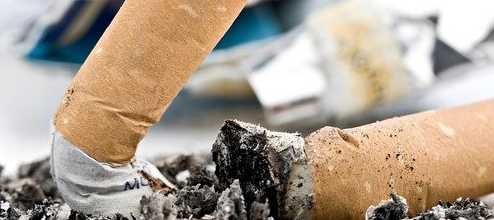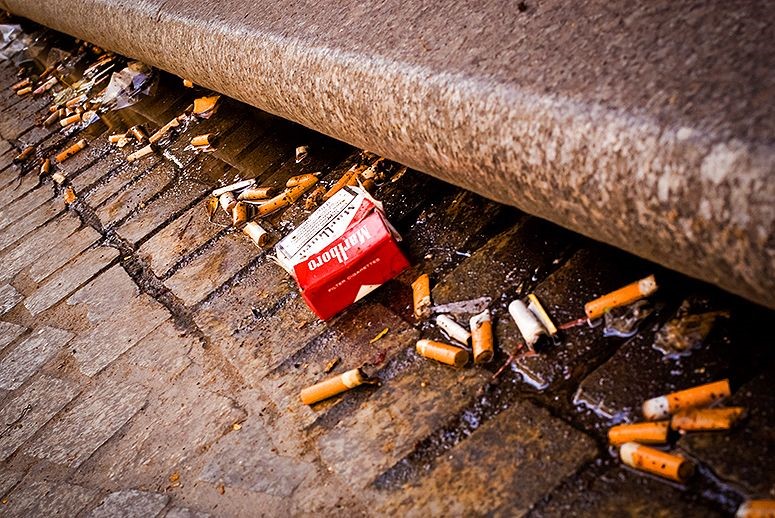
Pricing incentives kick butts
Cigarette butts are one of the most common types of litter in the world. And while most people would agree that they’re unsightly, cigarette butts are also an environmental hazard and a headache for municipalities. Fortunately, cities such as North Vancouver are pushing for new ways to encourage smokers to stop littering. Could price incentives make cigarette butt litter a thing of the past?
Feeling the burn
Wherever people go, cigarette butts follow. Parks, beaches, sidewalks. You name it, cigarette butts are tossed just about everywhere. And although the number of cigarette sales in Canada have fallen by half since 1980, cigarette litter in public spaces is ubiquitous. The City of Ottawa, for example, estimates that one-third of cigarettes smoked daily end up on the ground. If this ratio holds true across Canada, then roughly 1,654 tonnes of cigarette butts in Canada were littered in 2014 (the weight of 12 blue whales!).
For most people (myself included, before writing this piece), cigarette litter seems no more harmful than other types of litter. As it happens, however, cigarette butts are more than just a blight on public spaces. Cigarette filters are made from cellulose acetate—a type of plastic—and can take over a decade to decompose. This means the trampled cigarette butt in front of your house may be from an era before YouTube existed.
Perhaps more importantly, cigarettes contain toxins that have harmful environmental and health impacts. The problem is particularly bad in urban areas where cigarette butts accumulate en masse, especially after big rainfalls and end up in city sewers and waterways. Research from the University of San Diego found that the chemicals from just one cigarette butt is enough to contaminate a litre of water and kill small fish. They can be toxic if they’re mistaken for food by animals, or even children.

Cigarette butts are also a headache for municipalities. In addition to the expensive bill for trash cleanup, butts can clog storm drains and sewers. This requires extra maintenance, but also poses a risk to water quality.
These health and environmental damages have real economic costs. In economic jargon, cigarette litter generates negative externalities; remedies that reduce cigarette litter can therefore bring about meaningful health and environmental benefits.
A policy that butts-in to help butt-out
Cities are looking for fresh ideas to divert cigarette butts from streets and sewers. Traditional approaches, such as increasing littering fines or increasing the availability of public ashtrays, don’t seem to be working well. Neither of these approaches can deal with the scale of the problem: fines are difficult to enforce, and it’s impossible to have sufficient ashtrays to make a dent in cigarette litter.
The cities of Vancouver and North Vancouver are taking a different tack. Both cities are advocating for a provincial deposit-refund scheme for cigarette butts. I had the chance to speak with Darrell Mussatto, Mayor of the City of North Vancouver, to learn more about the proposal last week.
A deposit-refund scheme for cigarette butts would be similar to the familiar deposit-refund system for beverage containers. As Mayor Mussatto explained, governments would tack a fee onto every package of cigarettes bought in the province (say, $1 per pack), and would provide a full refund of the fee when people return their butts. It would also provide an incentive for people willing to collect orphaned cigarette butts, and lead to cleaner streets.
A deposit-refund would work a little differently than other cigarette taxes. Traditional cigarette taxes (a.k.a. ‘sin taxes’) aim to internalize the health consequences of smoking and try and incentivize people to smoke less by increasing the price.
The purpose of the deposit-refund, however, isn’t to have people smoke less (although it may help with that too). Rather, the idea is to incentivize people dispose of their butts at a designated depot. Such deposit-refund schemes have proven an effective way to reduce the waste of other consumer products while also increasing recycling rates. They put the onus back onto the consumer or producer, rather than having cleanup costs footed by the general tax base. In econ speak, the cost of running the program is internalized within the final price. Mayor Mussatto believes that less cigarette litter will also curtail the social acceptability of smoking.
I like disposed butts, and I cannot lie
The case for reducing cigarette litter is an easy one to make—everyone (even smokers) are probably in favour of having fewer butts in public spaces. What’s harder, however, is to come up with practical solutions that incentivize people to butt-out in better and less harmful ways.
The deposit-refund scheme proposed by Mayor Mussatto could be such a solution. Physicians for a Smoke-Free Canada believe that a deposit-refund scheme is the best way to deal with cigarette litter, and have offered details on how such a program in B.C. could be designed. Mayor Mussatto believes that this policy could “get rid of cigarette butts in public places altogether” and has received positive feedback from other municipalities in B.C. Emerging technologies also present an opportunity to recycle butts into new and useful things.
The Mayor is taking his proposal to the Union of B.C. Municipalities next week where he’ll try to garner wider support. Ultimately, such a policy would need provincial assent. But regardless of whether the idea gains traction with the province, it’s a creative way to harness the power of pricing incentives. It could help banish butts from public spaces, perhaps for good.




Comments are closed.